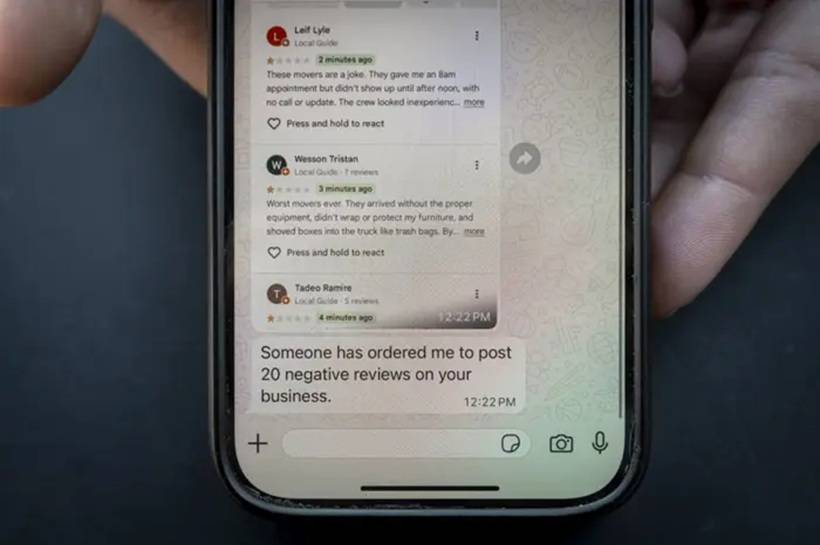A Message That Changed Everything - In June, Los Angeles contractor Natalia Piper was busy juggling her day-to-day business when a strange WhatsApp message appeared. The sender, using a number from Pakistan, bluntly stated: "Someone has ordered me to post a negative review on your business. Got an order to post 20 reviews."
At first, Piper was startled but curious—so she replied, asking who had made such an order. That single response was enough to pull her into a scam that is quietly spreading across the world, targeting small businesses through one of their most vulnerable assets: online reviews.
How the Scam Works
The scheme is simple yet damaging. Fraudsters threaten to flood a company's Google Maps profile with fake 1-star reviews, then demand money to stop—or to remove reviews already posted. For small businesses like contractors, movers, or repair services that rely heavily on positive ratings to attract customers, even a handful of negative reviews can be devastating.
Removing these reviews isn't easy either. Google allows businesses to report suspicious reviews, but the process is slow and inconsistent. In the meantime, those fake ratings can tank a business's reputation overnight.
Piper experienced this firsthand. She paid $150 to someone using a Bangladeshi number to remove fake reviews. Weeks later, another scammer from Pakistan demanded $100 more. By the time she stopped paying, her perfect 5-star rating had dropped to 3.6 stars. "It took me eight years to build my reputation," she said. "One guy can destroy it in a single day."
The Larger Problem of Fake Reviews
Fake reviews are not new. In fact, companies like Google and Amazon remove hundreds of millions of fraudulent reviews every year. But many slip through the cracks, and now, artificial intelligence has made the problem worse—giving scammers the ability to churn out realistic, persuasive-sounding reviews at massive scale.
Kay Dean, a former federal criminal investigator, has been studying the trend through her watchdog group Fake Review Watch. She's identified more than 150 businesses worldwide that were victims of this scam. "There's a whole underworld of fake reviews," she explained. "Most people don't realize just how much of what they're reading online is manipulated."
Why Google Is Under Fire
Business owners and watchdogs alike have criticized Google and other review platforms for not doing enough. They argue that moderation is opaque, businesses have little recourse, and fake accounts are often left active even after patterns of abuse become obvious.
The U.S. Federal Trade Commission (FTC) tried to tighten rules in 2024 by outlawing fake positive reviews. But those regulations didn't force platforms like Google, Yelp, or Amazon to change how they handle negative ones. Under Section 230, these platforms are still broadly shielded from liability for content posted by users.
Google insists it's fighting back, saying it removes "the vast majority" of fake content before it's ever seen. A spokesperson said more than 900,000 accounts have been restricted for repeated violations. Still, the company admits it's developing a new reporting tool specifically for businesses under attack—though no details or timeline were given.
Stories Beyond Los Angeles
Piper isn't the only one who has faced this nightmare.
In Georgia, Nick Betourney had painstakingly built his moving company's online reputation, eventually earning a 5-star rating. Then, one August morning, he too got a WhatsApp message warning him that 20 fake reviews were about to hit his page. Within days, they appeared—complete with elaborate false stories about movers smashing boxes in front of customers.
"They target smaller service businesses that don't get a lot of reviews," Betourney explained. "For us, one or two bad ones really hurt."
When pressed, one scammer openly admitted to The New York Times that his "business" involved selling both positive and negative reviews—$100 for 20 posts. He claimed it wasn't extortion, just "offering businesses the chance to pay before the reviews went live."
The Impact and What Businesses Can Do
The damage is more than reputational—it's financial. Piper said until the reviews were removed, her phone stopped ringing. Customers vanished. For small businesses, a week without leads can mean thousands in lost revenue.
One of Piper's solutions was surprisingly simple: she removed her cellphone number from business listings, cutting off scammers from contacting her directly. She now advises others in her network to do the same.
A System That Needs Fixing
Patterns of abuse—like the same account posting fake reviews across dozens of unrelated businesses—should be easy for Google to detect, yet watchdogs say they remain live far too long. Until the system changes, business owners will remain vulnerable to this form of digital extortion.
As Dean put it: "It's an ocean of disinformation, and the average person has no way to sort real from fake."
